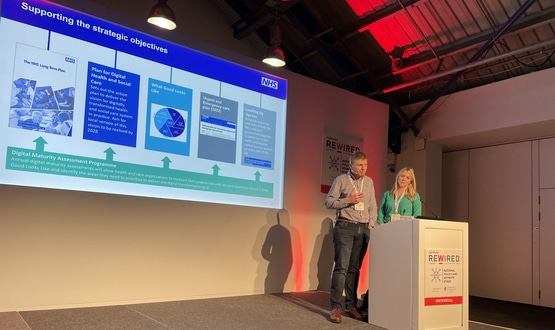Real value of digital maturity assessment lies in “starting conversations”
- 17 March 2023

NHS England’s new digital maturity assessment (DMA) questionnaire can support valuable discussions about local priorities, one of those involved in the pilot has said.
According to Amy Freeman, chief digital information officer at University Hospitals of North Midlands NHS Trust, completing the self-assessment “enabled us to have a really important conversation about whether we agree these things are important to us as an organisation”.
Speaking to audiences at Digital Health Rewired, she added: “And if we do agree it’s important and are scoring poorly, what are we going to do about it? That has informed our plan for the year – we’ve prioritised some projects and it enabled us to have that conversation.”
According to Will Goodwin, NHS England’s assistant director of programmes for digital maturity, the creation of the What Good Looks Like framework provides a new opportunity to understand trusts’ individual positions.
The framework, which outlines how digital success is defined for NHS organisations, provides what Goodwin characterises as a “North Star” against which progress can be measured.
That said, he emphasised the DMA questionnaire is not intended to inform a league table. “We want to leverage and utilitise the data for good planning and investment.”
The idea is that by having a consistent metric used for all organisations, it will make it easier to pinpoint precisely which would most benefit from additional national support to make digital progress.
“We ended up procuring a product which involves an assessment, with the assessment aligning to the seven domains of What Good Looks Like, and we also have support offered around that,” Goodwin explained.
There will also be workshops at ICS and regional level to help local staff understand how to integrate the data into their local planning.
“It will be really important to help systems plan what they need to do and where they prioritise investment over next three years,” said Paul Gilliatt, programme director for frontline digitisation at NHS England’s Transformation Directorate.
“But it also builds a national picture which is important when having discussions with ministers and treasury on how much money we need [to help create a digitally mature NHS].”
“The driver has been to develop with frontline colleagues something that can help with planning and investment,” added Natalie Sutcliffe, delivery and engagement lead for digital maturity at NHSE.
“By synthesising questions [which are currently asked across several separate data requests], we’ll have one credible source of truth on digital maturity.”
Difficult decisions about local funding
For North Midlands’ Freeman, the next step will be “potentially difficult conversations” about how local funding should be allocated to bolster digital maturity.
“It’s a really thorny issue for the ICS to unpick,” she said. “DMA is a prioritisation tool. It’s what we choose to do with those results that matter next, and some of those conversations are going to be tricky. We need to be able to work together in partnership to leverage the benefit of the whole rather than individually.”
National assessments of digital maturity have been somewhat stop-start in recent years. An overall assessment of NHS organisations in England was last completed in 2016/17, but other versions preceded it.
The initial deadline for submission of the current DMA is this Sunday, 19 March 2023. The speakers from NHS England emphasised their aim is for the latest assessment to be a yearly programme, making it possible to assess progress over time.
The topic of digital maturity in the NHS has been a hot one over the past 12 months. At Rewired 2022, NHS England’s director of transformation Tim Ferris said that the current level of digital maturity across the NHS is “patchy”.




